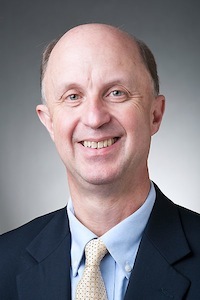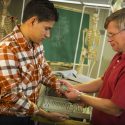Symposium links human, animal, environmental health
The Global Health Symposium at the University of Wisconsin–Madison reflects a decade of interdisciplinary global health work on campus, says Dr. Christopher Olsen, this year’s keynote speaker.

Christopher Olsen
“One Health: Making the Connections,” begins at 4:30 p.m. Tuesday, April 1, in the Health Sciences Learning Center. More than 50 students and faculty and staff members will participate in panel discussions and present posters showcasing their work.
Their investigations delve into an array of medical, policy and environmental factors that influence health and illness, including:
- Identifying barriers to childhood immunizations in rural Uganda
- Building sustainable livelihoods in Sierra Leone
- Developing a model for veterinary medical care in Ecuador
- Improving medical education for Ethiopian women
- Understanding the health impacts of climate change in eastern United States
- Identifying new disease threats to wildlife
UW-Madison’s Global Health Institute (GHI) with the Schools of Medicine and Public Health (SMPH), Nursing, Pharmacy and Veterinary Medicine sponsor the symposium. It is co-sponsored by the SMPH Global Health Interest Group.
Olsen, interim vice provost for teaching and learning and professor of public health in the School of Veterinary Medicine, was among 24 faculty members convened in 2001 to coordinate and establish policies for UW–Madison’s global health efforts.
He remembers the initial meetings: “When we looked at the collection of people in the room, we knew we could do a lot more to establish a global health presence on campus if we kept on meeting and talking.”
The first annual Global Health Symposium was organized in 2004 to further connect students, faculty and staff who were doing interesting global health work, Olsen says.
“The symposium is an event people look forward to, and it represents content from across the campus,” Olsen says. “It’s a great reflection of the interdisciplinary sense at the UW–Madison.”
“One Health, which recognizes human health is linked to the health of animals and the environment, is an integral framework to bring to all global health work, and we’ll be doing more in that area in the next few years.”
Jonathan Patz
Each year, the symposium’s theme also provides a path for follow-up action, GHI director Jonathan Patz says.
“One Health, which recognizes human health is linked to the health of animals and the environment, is an integral framework to bring to all global health work, and we’ll be doing more in that area in the next few years,” Patz says.
One Health is a way to solve issues at a global scale through interdisciplinary collaboration, Olsen says. His keynote address will explore issues around the world that require the One Health approach, such the movement of influenza from animals to humans and the geographic expansion of the mosquito-born chikungunya.
“No one person can be broadly trained enough in today’s world to address these major problems alone,” Olsen says. “UW-Madison is uniquely poised to contribute to these big global issues from a One Health perspective because of the world-class units we have on this campus.”
With key cross-sector collaborations spanning physical, biological and social sciences and the humanities, the university has the collective intelligence, creativity and will to tackle what are often seen as unsolvable challenges.
For more information on GHI, click here.
– Ann Grauvogl


